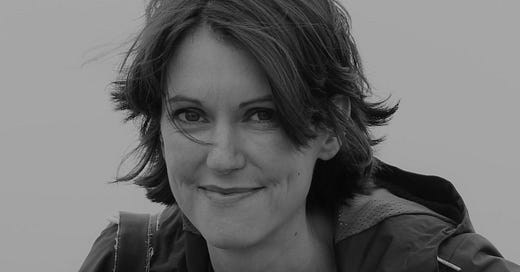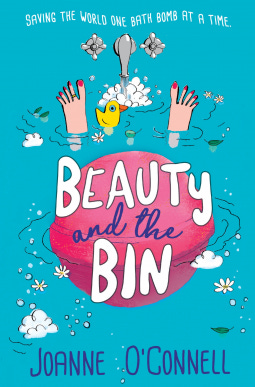My debut novel, Beauty and the Bin was partly inspired by my food journalism, particularly by a column I wrote for the Guardian, about giving up supermarkets.
For twelve months, I whizzed nettles into pesto, baked my own bread, grew vegetables, and stocked up on everything from chilli flakes to tomato ketchup at my local independents. At first, it was about saving money (it was for the consumer affairs section of the paper) but alongside the savings (£2,000 in a year, by the way!) it allowed me to explore how to live and eat in ways that protect the planet.
It led to so many inspiring conversations, with people like eco chef Tom Hunt, Hugh Fearnley-Whittingstall of River Cottage, and expert forager Fiona Bird. I ate seaweed spaghetti on a Scottish Island, drank velvety smooth chocolate with a chocolatier in London, and learnt about everything from hydroponics to how much perfectly edible food gets wasted each year. And I didn’t just write about this stuff, the point of the column was to live it. So, my sourdough starter bubbled on the kitchen worktop, peas grew up the garden fence and the windowsills of my house became a blur of leafy salad greens (much of which ended up in Beauty and the Bin).
Once the column was over, I carried on writing for the Guardian sustainable team, and begun to research my non-fiction food history book: The Homemade Vegan – which led me to connect with lots of climate pioneers all over the world.
As a journalist and a non-fiction writer, you interview so many people. You’re looking for the real reasons behind what they say and do, and the privilege of the job is that it allows you an access to others from politicians to pop stars to the people eating surplus food from the supermarket bins. But there are things you can’t say easily in journalism. You can report what people do or say but you can’t say for sure what they’re thinking. Plus, there’s a formula, which you must write to, there are fact checks and fast-paced deadlines.
The more I thought about my writing, the more I realised there are things that novelists can say that journalists can’t. That sounds so basic! But this was my process. I knew I wanted to write a truthful, honest book about that awkward tug between family and friends when you're just trying to find your place in the world. So, I wondered if writing a novel for children was also a great way to share what I’d learnt about food, and climate-friendly ways of eating - a new way of writing the story. And I knew I wanted the story to be a fun, light-hearted, magazine-style read, which could inspire a reader or two (fingers crossed) but which didn't heap pressure on younger generations or worry them.
But it wasn’t really until the final edit of the book that I realised how much the story had been influenced by my journalism work. The characters in Beauty and the Bin are nearly always either eating or putting food on their faces or feet; the family lives in a hydroponic growing farm, where Laurie, the main character, makes her plant-based beauty products from surplus food. And while I did of course know the idea for this book had sprung from my journalism and love of food, even I was surprised to discover that the word chocolate appears 91 times.
‘You have two choices, Laurie. You can either get some food out of the bins to take to the party or you can get back into the car and sulk.’
Laurie got back into the car and sulked.
Unconcerned, her mum picked up the bags. ‘Come on, Fern,’ she said to Laurie’s little sister. ‘Last night’s rubbish should still be in the containers. We’re looking for bagels, salad, strawberries . . .’
‘Can I get into the actual bin?’ asked Fern, jumping up and down on the spot. Her bracelets, home-made from bottle tops, jangled loudly. ‘Like properly inside it? And throw things over to you?’
‘But you’re the lookout,’ said Mum. ‘What if the manager comes out and you don’t give me the signal in time?’
Laurie pulled her cardigan around her. Normal people, she thought, don’t slip around the back of supermarkets and take things out of the bins for free. She stared out of the window. It was nearly seven o’clock on a Saturday evening and the car park was busy. Shoppers were going through the shiny doors, into the brightly lit aisles to pay for groceries.
Her eyes rested on a girl and her mum – both dressed in this season’s statement jeans – who were trying to prise a trolley out of the rack. The mum kept tugging on the handles and then throwing her arms up, panto-style. Laurie couldn’t see the girl’s face but she was tossing her blonde ponytail.
She’s probably laughing, thought Laurie. Like I’d be, if I hadn’t been asked to climb into a bin and splatter myself with yogurt, custard and hummus.
You can find out more about Beauty and the Bin here.
This article originally ran in the newsletter in 2021.
Joanne O’Connell is a journalist whose inspiration sprang from a year-long column she wrote for the Guardian called ‘Goodbye Supermarkets’, during which she met food waste campaigners, such as Hugh Fearnley-Whittingstall and eco-chef Tom Hunt, and presented a short video about taking her children foraging on a Scottish Island. She has written for The Observer, The Times, The Daily Express, The Independent and various glossy magazines, and is the author of The Homemade Vegan, published in 2016. She occasionally appears on television and radio, most recently on BBC Breakfast and Radio 4’s Woman’s Hour.
Free Online Climate Conference
Mirrors or Movers is the world's premier conference dedicated to investigating, debating and challenging the impacts of media content on society and the environment. This year marks the eleventh edition.
This year’s conference will explore whether a positive brainprint is now a commercial no brainer. Our range of speakers and discussions will explore how producing content with a positive impact on society is increasingly becoming a commercial imperative. Amongst our confirmed speakers so far are:
Laura Bates, Founder of the Everyday Sexism Project
María Mendiluce, CEO at We Mean Business Coalition
Jennifer Estaris, Game Director at ustwo games
For the full list of speakers, which we will continue updating, please see our website
Attended by opinion formers, academics, NGOs and media professionals, including both sustainability professionals and content makers, the conference is free and open to those within media, sustainability or who are looking to learn more. Media will be represented in all its diversity – broadcast, publishing, entertainment, advertising, expos, events, and more.





